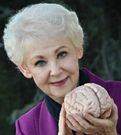Part 4 - Immune “Busters”
©Arlene R. Taylor, PhD www.ArleneTaylor.org

In combination with your brain, how long and how well you live is related to immune system functions. While unexplained healings do occur, generally if you get sick and if you get well, you can thank this healing system.
Your immune system is designed to prevent illnesses (where possible) and heal illnesses that could not be prevented (or were not prevented through personal lifestyle choices).
Some factors suppress immune system functions: busters, if you will. Here are examples.
- Unmanaged emotions. Unmanaged emotions of anger, fear, sadness, along with guilt and unforgiveness create a chemistry that interferes with normal immune function. Arguing suppresses the immune system. School children who complain of a headache or stomachache often come from an environment of arguing or fighting adults. Bereaved spouses have shown impaired immune system function for months.
- Insufficient sleep. Your brain works harder while sleep than when you are awake. During sleep the brain-body immune systems are repaired, and immune system cells replenished. Waste products are eliminated from the blood and lymph fluid. If you cut sleep, all the “housekeeping” and “repair” jobs likely will not be completed in a timely manner, if at all. If they are not completed, both the brain and body health will be impaired.
- Dehydration. An inadequate intake of water can shrink brain cells, causing brain tissue to pull away from the skull. Energy levels fall as the brain uses the movement of water in and out of the cells to produce electricity and energy. It can also cause thickening of both blood and lymph fluid, reducing the effective elimination of waste products and increasing the risk of blood clots in the heart, brain, and lungs.
- Lack of exercise. Movement of lymph fluid depends on the movement of large muscle groups surrounding the lymph vessels, whose walls―unlike blood vessels―do not contain muscles. Inadequate amounts of activity and exercise can slow the movement of both lymph fluid and circulating blood, interfering with the delivery of necessary macro and micronutrients to the cells.
- Chronic anxiety and worry. These forms of fear can interfere both with sleep and clear thinking and can alter the production of hormones and other key body substances. Anxiety can also contribute to downshifting of the brain―that is, a focus of energy and attention away from the pre-frontal cortex and down toward the brain stem where fight-flight and other stress reactions are housed. Ultimately, that can suppress the immune system.
- Refined and processed foods. Refined sugar, white flour, and many sources of fat—along with processed and packaged foods—do not provide the level of quality nutrients required for optimum brain-body health. Sugar seriously impairs the ability of the immune system front-line fighter cells. High-low spikes in blood sugar levels in the brain can impact memory negatively. Even an overindulgence of natural sugars—such as honey―can trigger a stress response that lasts for about five hours.
- Exposure to toxins. This includes poisons, pesticides, pollution, cigarette smoke and second-hand smoke, alcohol, so on. Sugar in food and beverages acts as a toxin to the brain triggering a reaction like that of a virus or bacteria. The resulting immune response may result in cognitive deficits, such as those associated with dementias or Alzheimer’s.
- Unmanaged stressors. Unmanaged stress accelerates aging, suppresses immune system functions, kills brain cells, triggers eating outside of nutritional balance, and increases the risk of dementia. Worry and anxiety (forms of fear) tend to trigger the stress response. So can long and unprotected exposure to blue wave light emitted by many electronic devices.
Avoid or minimize these common immune system suppressors or Busters! Use your brain power to focus on incorporating strengtheners or Boosters into your daily routines. A place to begin is with the 14 researched components of a Longevity Lifestyle.
Because it matters, these immune system boosters are outlined in Part 5.

